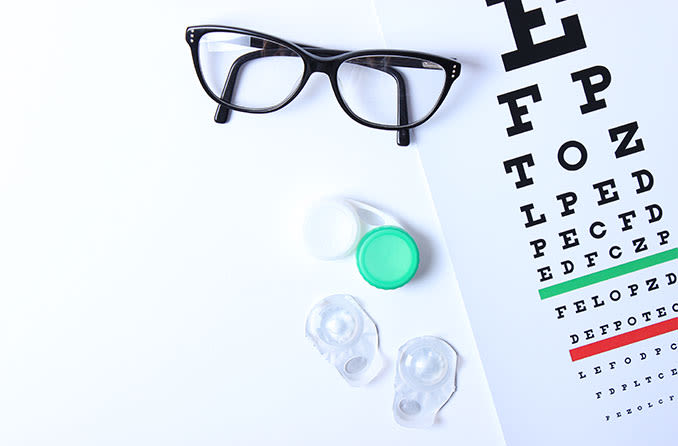Eyeglasses vs. Contact Lenses: Which Is Right for You?
If you are considering wearing eyeglasses or contact lenses to correct your vision, you should consider lifestyle, comfort, convenience, budget, and aesthetic considerations before making your decision.
Consider the pros and cons of both contacts and glasses before choosing between them; each has its own characteristics in terms of vision, ease of use, and eye health.
In comparison to contact lenses, eyeglasses provide many advantages. In addition to not requiring much cleaning and maintenance, glasses do not require you to touch your eyes while wearing them (reducing the risk of eye infections), and they are much more affordable over time because they do not require frequent replacements as contact lenses.
Additionally, eyeglasses can provide a level of vision and comfort that contact lenses cannot – they can adjust the amount of light entering your eyes. The photochromic lenses offer clear vision in all light conditions, particularly at night and during the day. In the sun, they darken automatically, providing clear and comfortable vision. A photochromic eyeglass lens blocks 100% ultraviolet light, protecting the eye not only on the inside, but also on the outside and on the eyelids, even though some contact lenses may block some UV light from entering the eye.
Additionally, glasses can be used as a fashion statement as well as an extension of your personality.
Even so, contact lenses offer many advantages over glasses. Contact lenses sit directly on your eye, which makes the vision of your peripheral vision unobstructed. With colour contact lenses, you can even change the colour of your eyes while participating in sports or outdoor activities without worrying about eyeglasses getting in the way, falling off or breaking.
What are the benefits and disadvantages of each type of eyewear to help you make a decision? Here is a breakdown of the advantages and disadvantages of each type of eyewear to help you make your decision.
PROS AND CONS OF CONTACT LENSES
The advantages
-
With contact lenses, your field of vision is expanded because they conform to the curvature of your eye, resulting in fewer distortions and obstructions than with glasses.
-
When exercising and playing sports, contact lenses do not interfere.
-
There will be no clash between your contact lenses and your clothing.
-
A contact lens does not generally become foggy in cold weather and is not affected by weather conditions.
-
It is possible to experiment with color contact lenses to see how you will look with different eye colors. You may even be able to purchase costume-related contact lenses for Halloween or fancy dress occasions.
-
Orthokeratology (Ortho-K) temporarily corrects myopia by reshaping your cornea while you sleep. This allows you to see clearly the next morning without the need for glasses or contacts.
The disadvantages
-
In most cases, proper technique and practice should alleviate the issue of difficulty applying a contact lens to the eye.
-
Dry eye syndrome is caused or made worse by the use of contact lenses, which reduce the amount of oxygen reaching your eye.
-
The symptoms of computer vision syndrome are likely to be exacerbated if you wear contact lenses frequently while working at a computer.
-
To avoid potential serious eye infections, contact lenses should be properly cared for and lens cases should be cleaned daily. If you are not able to keep up with the recommended replacement cycle for your contacts, consider daily disposable lenses.
-
It is likely that your eyes will become dry, gritty, red, and irritated if you accidentally fall asleep while wearing daily wear contacts. Considering extended wear contact lenses if you often fall asleep wearing your contacts is an option — some of these lenses can be worn for up to 30 days continuously.
PROS AND CONS OF EYEGLASSES
The advantages
-
In addition to reducing the need to touch your eyes, wearing glasses also reduces the likelihood of an eye infection or irritation.
-
The use of glasses will not exacerbate dry or sensitive eyes, as can the use of contact lenses.
-
In general, eyeglasses are less expensive than contact lenses in the long run because you do not need to replace them as frequently as contact lenses, and if your prescription changes over time, you may be able to keep your current frames and simply replace the lenses.
-
It is important to realize that frames are fashionable and can convey a lot of information about your personality and style.
-
Wind, dust, and debris can be protected from some extent by wearing glasses.
The disadvantages
-
When you first start wearing glasses or change your prescription, you may experience difficulty focusing on objects due to the distance between your ears and your eyeglasses.
-
Several people feel that glasses detract from the aesthetics of their face or conceal their features when they wear them.
-
It is possible that the edges of your lenses may be thick and unattractive if you have a strong prescription or your glasses may appear unnaturally reduced or magnified if you have a strong prescription.
-
A pair of glasses can be affected by the elements – rain collecting on the lenses or cold weather can cause them to fog up, obstructing or blurring your vision.
-
The constant pressure exerted by some frames may cause headaches and general discomfort behind the ears and on the nose.
What is the best option: contact lenses, eyeglasses, or both?
As contact lens technology advances, most people today can wear contact lenses successfully, even if they prefer to wear glasses as their primary method of correcting their vision.
As a result, it is usually a matter of personal preference as to whether to wear contacts or glasses.
In addition to wearing contact lenses full time, you should also own a pair of glasses in case your eyes become infected or irritating, or if you simply want a break from contacts.
















